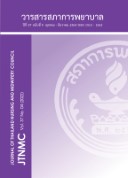Effects of Game-Based Learning on Nursing Students’ Knowledge of English Psychiatry Terminology
Keywords:
game-based learning, psychiatry terminology, knowledge, nursing studentsAbstract
Objective: To examine the effect of game-based learning on nursing students’ knowledge of English psychiatry terminology
Design: Two-group quasi-experimental research with a pre-test and a post-test
Methodology: A total of 60 undergraduate nursing students were recruited for this study and were randomly assigned to the control and experimental groups, 30 per group. The control group studied English psychiatry terminology from the ‘English Psychiatry Terminology’ book, whilst the experimental group studied English psychiatry terminology through playing English psychiatry terminology games. The data collection tool was the English psychiatry terminology
test, which was administered before and after the experiment. The data were analysed in terms of frequency, percentage, mean, and standard deviation, using Mann-Whitney U test, and Wilcoxon signed rank test.
Results: The experimental group’s mean post-test score on English psychiatry terminology knowledge was significantly higher than its pre-test score, at .001. After the intervention, the experimental group’s average score on English psychiatry terminology knowledge was also
significantly higher than the control group’s, at .001. On the other hand, no significant difference was found between the two groups’ mean scores on retention of English psychiatry terminologymemory.
Recommendations: Lecturers’ application of game-based learning to teaching can better integrate the contents of the course for the learners. This technique could contribute more effectively to the learners’ improvement of their knowledge of the course contents
Downloads
References
Jamjuree D. Learning style for Gen Z learners. Bangkok: The graduate school of Srinakharinwirot University; 2020. (in Thai)
Simpson L. Undergraduate nursing students’ learning style preferences and preferred faculty teaching methods compared to the actual methods used by faculty [Dissertation]. USA: East Tennessee State University; 2020.
Shorey S, Chan V, Rajendran P, Ang E. Learning styles, preferences and needs of generation Z healthcare students: Scoping review. Nurse Educ Pract. 2021; 57:103247.
Onsri P. The instructor’s role toeards 21st century learning skills. Journal of The Royal Thai Army Nurses. 2015;16(3):8-13. (in Thai)
Binbai S, Tanamai S. Computer games with learning in digital age. Technical Education Journal King Mongkut’s University Technology North Bangkok. 2014;5(1):177-81. (in Thai)
Riahipour P, Saba Z. ESP vocabulary instruction: investigating the effect of using a game oriented teaching method for learners of english for nursing. J LangTeach Res. 2012;3(6):1258-66.
Chaeya K, Jantharangkul S, Aunmuang S. Effects of vocabulary games in fundamental nursing course (SN201) of the second McCormick nursing student Payap University. Journal of Nursing Science & Health. 2012;35(2):83-90. (in Thai)
Li R. Does game-based vocabulary learning APP influence Chinese EFL learners’ vocabulary achievement, motivation and self-confidence? SAGE open. 2021:1-12.
Asniza IN, Zuraidah MOS, Baharuddin ARM, Zuhair ZM, Nooraida Y. Online game-based learning using kahoo! to enhance pre-university students’ active learning: a students’ perception in biology classroom. J Turk Sci Educ. 2021;18(1):145-60.
Chu HC, Chen JM, Kuo FR, Yang SM. Development of an adaptive game-based diagnostic and remedial learning system based on the concept-effect model for improving learning achievements in mathematics. J Educ Techno Soc. 2021;24(4):36-53.
Rodkhun K, Yiemkuntitavorn S, Mejang A. The effectd of using games on english vocabulary leraning and retention of prathom suksa V students. Journal of Graduate Studies Valaya Alongkorn Rajabhat University. 2016;10(2):1-10. (in Thai)
Bunjrong D. Comparing the learning outcome of studying of Chinese vocabularies (remembering vocaburaries and pronunciation) with normal teaching and active learing by games. Walailak Abode Culture of Journal. 2018;18(2):115-44. (in Thai)
Lui S. Use of gamification in vocabulary learning: a case study in Macau. OALib Journal. 2017;4(8):90-7.
Suksiri S. The study of effectiveness of game based learning approach [Dissertation]. Bangkok: National Institute of Development Administration; 2007. (in Thai)
Thorndike EL. Human learning. Cambridge, Mass: M.I.T. Press; 1996.
Cohen J. Statistical power analysis for the behavioral sciences. (2nd ed.). Hillsdale, NJ: Lawrence Erlbaum; 1988.
DeVon HA, Block ME, Moyle-Wright P, Ernst DM, Hayden SJ, Lazzara DJ, et al. A psychometric toolbox for testing validity and reliability. J Nurs Scholarsh. 2007;39(2):155-64.
Atkinson RC, Shiffrin RM. Human memory: a proposed system and its control processes. In: Spence KW, Spence JT, editors. The psychology of learning and motivation 2. New York: Academic Press; 1968. p. 89-195.
Srimora N. The comparison of achievement and retention on learning vocabulary words by game and flashcard techniques of the sixth graders. Journal of Education Bangkokthonburi University. 2019;7(2): 102-9. (in Thai)
Downloads
Published
How to Cite
Issue
Section
License
Copyright (c) 2022 Thai Journal of Nursing Council

This work is licensed under a Creative Commons Attribution-NonCommercial-NoDerivatives 4.0 International License.








